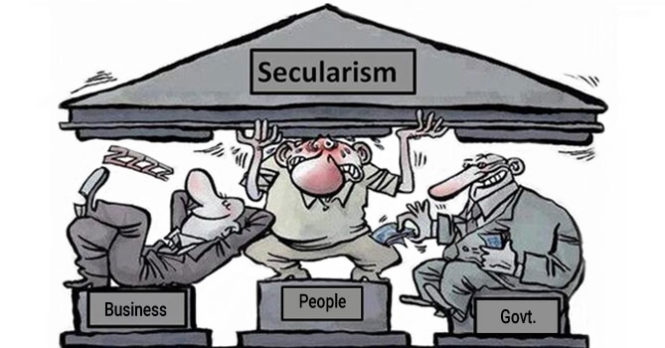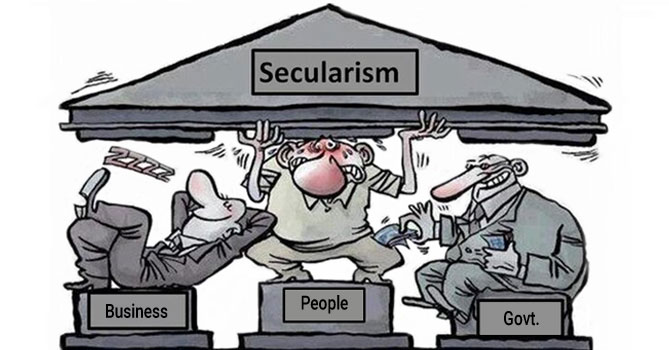
Every citizen of India needs to be aware of the Fundamental Rights guaranteed by the Constitution of India. The Fundamental Rights enjoyed by all citizens are:
- Right to Equality
- Right to Freedom
- Right against Exploitation
- Right to Freedom of Religion
- Cultural and Educational Rights
- Rights to Constitutional Remedies
- Right to Privacy
- Right to Information
While the Constitution of India defines all the rights enjoyed by all citizens of India, lack of awareness of these rights due to lack of education, poverty, lack of information access, cultural and social disparities, and even economic divide, all contribute to ignorance abuse and denial of fundamental rights to citizens.
The problem is not in the definition of rights but its interpretation and selective application by sections of the society. The framers of the Indian Constitution drew inspiration from the British Jurisprudence, where the enforcement of fundamental rights is rigidly defined.
However, the framers in India were aware of the vast socio-cultural-economic diversity in India and recognised the challenges associated with defining the form of proceeding for the enforcement of the fundamental rights and were, therefore, left open.
The problem is in lack of information and awareness among the common citizens of when to recognise the violation of fundamental rights and when to approach the court for its enforcement. For instance, Article 32 and Article 226 allows any citizen to approach the court if he or she feels denied or exploited of the fundamental right.
India’s Fundamental Rights and where we stand in their implementation
Daily, fundamental rights continue to be violated across India.
Right to Equality
Let’s take the Right to Equality. Article 15 and 16 clearly states all are equal before the law and prohibits any discrimination on the basis religion, race, caste, sex, or place of birth.
However, this right is often denied to people from the illiterate class or among those not aware of their fundamental rights. For example, Dalits often face discrimination in job selection in many parts of India but do not approach the courts for justice either due to lack of awareness or not affording the legal cost or sheer fear of the long-drawn judicial process for getting justice. The result is the denial of fundamental rights guaranteed by the Constitution.
The problem is not restricted to rural areas alone but urban cities and metros as well. Take discrimination on religious grounds as an example.
In several cities, it is common for people of a certain community to be denied the opportunity to rent an apartment in a cooperative society. They are politely turned down. Most move on in the hope of finding another apartment in another location. Many are unaware that no society or residential complex can deny admission on the grounds of religion.
The problem continues to fester as the onus lies on the individual to prove denial of admission is due to religion, as the society in question will not say the same in writing. It is a classic case of denial of the fundamental right.
Right to Education
The Right to Education is another fundamental right, and every child enjoys equal opportunity to learn. But here again, the discrimination happens based on caste, religion, economic condition, parent profile, etc. The problem is widespread in both urban and rural areas.
Right to Employment
Right to Employment at the village level is another widespread and underreported issue. Contract jobs for working on government and private funded projects are offered based on political affiliation, caste and sometimes, religious identity.
Most don’t speak up as they are unaware of claiming their fundamental right to work and equal opportunity, and also for the cumbersome legal processes stated above. Gender discrimination and unequal pay are common infringement of fundamental rights.
Right against Exploitation
Right against Exploitation is a widespread issue with the underprivileged class of all communities suffering from those in power and position. The fundamental rights of this vulnerable section get trampled daily. Caste discrimination, along with abuse of power stands out. The right to full salary, as determined by the government, are commonly denied to the daily wagers.
The hapless labourer has to choose between no employment versus less pay, and frequently agree to work for lesser pay. It’s a clear case of Exploitation, but few know they can stand up and claim their rights and no one can stop it as per law.
The challenge remains, how an ordinary illiterate or semi-literate can claim fundamental rights and fight a well-entrenched exploitative system.
Right to Privacy
On 24 August 2017, the Supreme Court of India ruled the Right to Privacy was a fundamental right. The Personal Data Protection Bill 2019 seeks to protect citizen’s personal information from public or unauthorised access.
People are becoming aware of the need to protect personal information and data. As the technology matures and penetrates daily life, people’s personal information and activities are increasingly becoming public. Social media is one such example, albeit voluntary.
The government’s ability to monitor personal activity along with disseminating personal habits, behaviour, and interactions is a dangerous frontier if used irresponsibly or with mal intent. Examples of hackers getting unauthorised access to domestic activity inside people’s homes through IoT devices is a growing concern.
Large parts of India remain outside the cutting edge of technology penetration and remain ignorant of its dangers. Citizens need to be aware of one’s right to privacy, along with the risks of technology, which can be a double-edged sword.
Right to Information
The Right to Information (Amendment) Bill 2019 amends the Right to Information Act, 2005. All citizens of India have a right to know from the government what is relevant or of interest to them.
People have a right to information regarding the government structure, how it functions, and financial information related to administration and allocation of funds. The Act enables transparency and accountability to the people.
The government is elected by the people and those who serve in it as employees are paid salaries with the people’s money, and therefore, are accountable to the people. Once a citizen raises a query, the government must respond and answer to the question. The Right to Information Act, 2005, ensures it.
Remaining aware of one’s rights is the first step, and that is the responsibility of all citizens – to know what the Constitution guarantees.
Unfortunately, a quick survey among the 35+ years among the educated class in urban areas would reveal a large section remaining ignorant of their fundamental rights. The same holds for urban millennials.
Wake up people, claim your rights!
Related Link:





